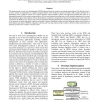Free Online Productivity Tools
i2Speak
i2Symbol
i2OCR
iTex2Img
iWeb2Print
iWeb2Shot
i2Type
iPdf2Split
iPdf2Merge
i2Bopomofo
i2Arabic
i2Style
i2Image
i2PDF
iLatex2Rtf
Sci2ools
LREC
2010
2010
Can Syntactic and Logical Graphs help Word Sense Disambiguation?
This paper presents a word sense disambiguation (WSD) approach based on syntactic and logical representations. The objective here is to run a number of experiments to compare standard contexts (word windows, sentence windows) with contexts provided by a dependency parser (syntactic context) and a logical analyzer (logico-semantic context). The approach presented here relies on a dependency grammar for the syntactic representations. We also use a pattern knowledge base over the syntactic dependencies to extract flat predicative logical representations. These representations (syntactic and logical) are then used to build context vectors that are exploited in the WSD process. Various state-of-the-art algorithms including Simplified Lesk, Banerjee and Pedersen and frequency of co-occurrences are tested with these syntactic and logical contexts. Preliminary results show that defining context vectors based on these features may improve WSD by comparison with classical word and sentence cont...
| Added | 29 Oct 2010 |
| Updated | 29 Oct 2010 |
| Type | Conference |
| Year | 2010 |
| Where | LREC |
| Authors | Amal Zouaq, Michel Gagnon, Benoît Ozell |
Comments (0)

